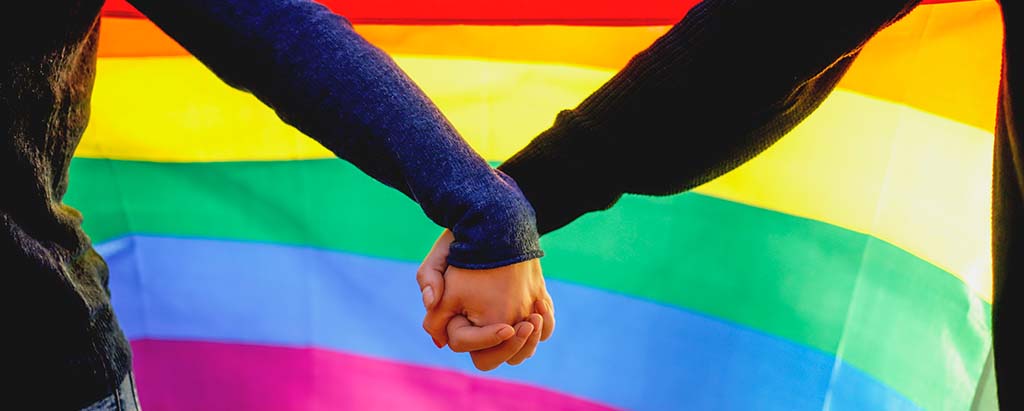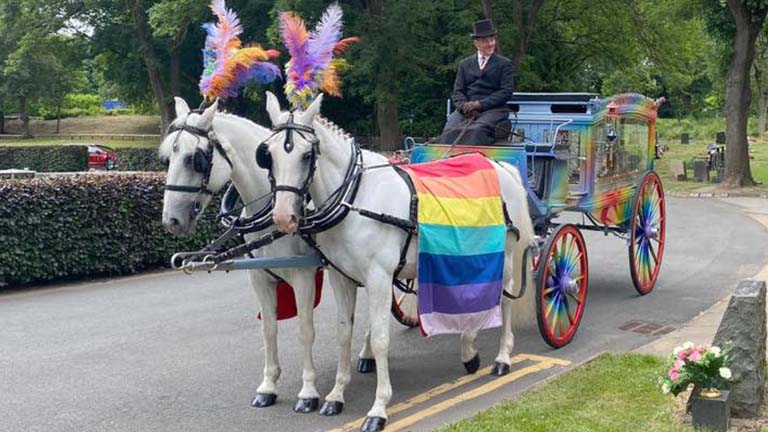Home / Help and Advice / Arranging a funeral / LGBTQ+ funerals: how Funeral Partners can support you
LGBTQ+ funerals: how Funeral Partners can support you
For LGBTQ+ people, thinking about death and bereavement can trigger a unique set of anxieties. Some may be worried about not having their relationships acknowledged, while others may be concerned about their sexuality becoming public after death or having their wrong gender identity addressed.
Here are some of the key concerns when planning your own or someone else’s funeral, and how Funeral Partners can help to support you.

What if my identity is not honoured at my funeral?
This is a common concern amongst members of LGBTQ+ communities. Family members can often either not be aware of the deceased’s sexual orientation or gender identity, or even not accept it. A funeral director’s role is to ensure the deceased’s wishes are carried out in a ceremony that befits them – from religious to non-religious, discreet to extravagant.
Certain family members did not accept me. How can I prevent them from taking over, and ensure my funeral plans are in the right hands?
It’s not unusual for family members to disagree over funeral arrangements in general. So it’s not surprising that many LGBTQ+ people have a fear that family members will railroad the arrangements with their personal opinions and steering the ceremony in an inappropriate direction.
If you’re planning your own funeral, be as open and honest as possible with your loved ones about what your wishes are, you can also create a funeral wishes document to include with your will, or if you purchase a funeral plan, your specific wishes will be recorded with your plan for when the time comes. And of course, discuss the details with your chosen funeral director. If you’re planning someone else’s funeral, carefully consider their wishes and discuss the details with your funeral director, who will act as an impartial intermediary with the deceased’s wishes at heart.


How can you prevent gender identity, relationships or sexual orientation from being disclosed inappropriately?
Many lesbian, gay, bisexual and trans people will have experienced intolerance towards their community, and may not have felt comfortable revealing certain details to their wider friends and family.
If you’re planning a funeral for a close friend or loved one, it’s important not to disclose their sexual orientation unless you have the permission of the person who has died. Inappropriate disclosure is an offence.
It’s also important to refer to the person as they referred to themselves – e.g. woman, man, non-binary, etc.
Will the funeral director be accepting of my identity?
Many people worry about this. With Funeral Partners, you needn’t. Our funeral professionals treat every person with respect, we are ethical and forward-thinking funeral directors and are accepting of all identities. We are sensitive, open-minded and considerate towards every client. Always.
If you’d like to know more about planning a funeral for an LGBTQ+ loved one or for yourself, or if you have a specific question, please do get in touch with your local funeral director.
Step by step guide
There are several steps in the Funeral Planning process you will have to consider.
Types of funerals
There are a number of different types of funerals available. Which type of funeral service is right for your loved one?
What happens at a cremation service?
Cremations are fast becoming the norm in Britain with over 70% of families choosing this type of
funeral.
Further Reading: Cost of a funeral
Find out about funeral costs and what financial support could be available.